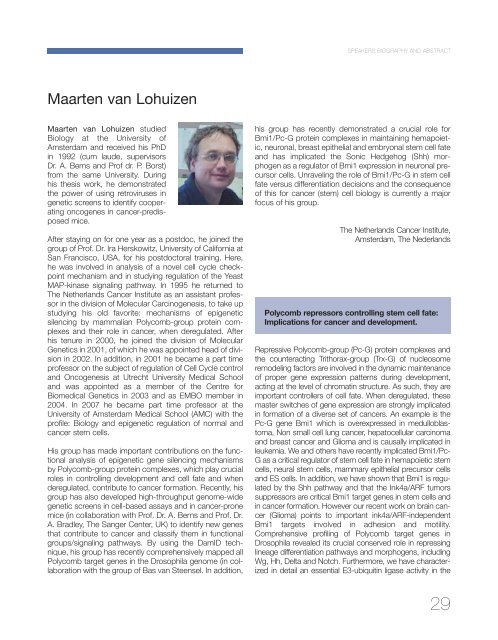PEBC Report - Programa de Epigenética y BiologÃa del Cáncer
PEBC Report - Programa de Epigenética y BiologÃa del Cáncer
PEBC Report - Programa de Epigenética y BiologÃa del Cáncer
You also want an ePaper? Increase the reach of your titles
YUMPU automatically turns print PDFs into web optimized ePapers that Google loves.
SPEAKERS BIOGRAPHY AND ABSTRACT<br />
Maarten van Lohuizen<br />
Maarten van Lohuizen studied<br />
Biology at the University of<br />
Amsterdam and received his PhD<br />
in 1992 (cum lau<strong>de</strong>, supervisors<br />
Dr. A. Berns and Prof dr. P. Borst)<br />
from the same University. During<br />
his thesis work, he <strong>de</strong>monstrated<br />
the power of using retroviruses in<br />
genetic screens to i<strong>de</strong>ntify cooperating<br />
oncogenes in cancer-predisposed<br />
mice.<br />
After staying on for one year as a postdoc, he joined the<br />
group of Prof. Dr. Ira Herskowitz, University of California at<br />
San Francisco, USA, for his postdoctoral training. Here,<br />
he was involved in analysis of a novel cell cycle checkpoint<br />
mechanism and in studying regulation of the Yeast<br />
MAP-kinase signaling pathway. In 1995 he returned to<br />
The Netherlands Cancer Institute as an assistant professor<br />
in the division of Molecular Carcinogenesis, to take up<br />
studying his old favorite: mechanisms of epigenetic<br />
silencing by mammalian Polycomb-group protein complexes<br />
and their role in cancer, when <strong>de</strong>regulated. After<br />
his tenure in 2000, he joined the division of Molecular<br />
Genetics in 2001, of which he was appointed head of division<br />
in 2002. In addition, in 2001 he became a part time<br />
professor on the subject of regulation of Cell Cycle control<br />
and Oncogenesis at Utrecht University Medical School<br />
and was appointed as a member of the Centre for<br />
Biomedical Genetics in 2003 and as EMBO member in<br />
2004. In 2007 he became part time professor at the<br />
University of Amsterdam Medical School (AMC) with the<br />
profile: Biology and epigenetic regulation of normal and<br />
cancer stem cells.<br />
His group has ma<strong>de</strong> important contributions on the functional<br />
analysis of epigenetic gene silencing mechanisms<br />
by Polycomb-group protein complexes, which play crucial<br />
roles in controlling <strong>de</strong>velopment and cell fate and when<br />
<strong>de</strong>regulated, contribute to cancer formation. Recently, his<br />
group has also <strong>de</strong>veloped high-throughput genome-wi<strong>de</strong><br />
genetic screens in cell-based assays and in cancer-prone<br />
mice (in collaboration with Prof. Dr. A. Berns and Prof. Dr.<br />
A. Bradley, The Sanger Center, UK) to i<strong>de</strong>ntify new genes<br />
that contribute to cancer and classify them in functional<br />
groups/signaling pathways. By using the DamID technique,<br />
his group has recently comprehensively mapped all<br />
Polycomb target genes in the Drosophila genome (in collaboration<br />
with the group of Bas van Steensel. In addition,<br />
his group has recently <strong>de</strong>monstrated a crucial role for<br />
Bmi1/Pc-G protein complexes in maintaining hemapoietic,<br />
neuronal, breast epithelial and embryonal stem cell fate<br />
and has implicated the Sonic Hedgehog (Shh) morphogen<br />
as a regulator of Bmi1 expression in neuronal precursor<br />
cells. Unraveling the role of Bmi1/Pc-G in stem cell<br />
fate versus differentiation <strong>de</strong>cisions and the consequence<br />
of this for cancer (stem) cell biology is currently a major<br />
focus of his group.<br />
The Netherlands Cancer Institute,<br />
Amsterdam, The Ne<strong>de</strong>rlands<br />
Polycomb repressors controlling stem cell fate:<br />
Implications for cancer and <strong>de</strong>velopment.<br />
Repressive Polycomb-group (Pc-G) protein complexes and<br />
the counteracting Trithorax-group (Trx-G) of nucleosome<br />
remo<strong>de</strong>ling factors are involved in the dynamic maintenance<br />
of proper gene expression patterns during <strong>de</strong>velopment,<br />
acting at the level of chromatin structure. As such, they are<br />
important controllers of cell fate. When <strong>de</strong>regulated, these<br />
master switches of gene expression are strongly implicated<br />
in formation of a diverse set of cancers. An example is the<br />
Pc-G gene Bmi1 which is overexpressed in medulloblastoma,<br />
Non small cell lung cancer, hepatocellular carcinoma<br />
and breast cancer and Glioma and is causally implicated in<br />
leukemia. We and others have recently implicated Bmi1/Pc-<br />
G as a critical regulator of stem cell fate in hemapoietic stem<br />
cells, neural stem cells, mammary epithelial precursor cells<br />
and ES cells. In addition, we have shown that Bmi1 is regulated<br />
by the Shh pathway and that the Ink4a/ARF tumors<br />
suppressors are critical Bmi1 target genes in stem cells and<br />
in cancer formation. However our recent work on brain cancer<br />
(Glioma) points to important ink4a/ARF-in<strong>de</strong>pen<strong>de</strong>nt<br />
Bmi1 targets involved in adhesion and motility.<br />
Comprehensive profiling of Polycomb target genes in<br />
Drosophila revealed its crucial conserved role in repressing<br />
lineage differentiation pathways and morphogens, including<br />
Wg, Hh, Delta and Notch. Furthermore, we have characterized<br />
in <strong>de</strong>tail an essential E3-ubiquitin ligase activity in the<br />
29


